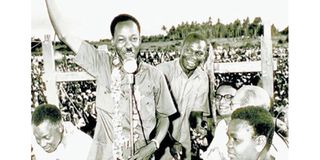How Tanzania became a single-party state in 1965

Tanganyika’s Founding President, Mwalimu Julius Kambarage Nyerere, addresses a public rally during the early days of independence. Tanganyika cherished the multi-party system when it became independent in 1961 until 1965 when the system was revoked. PHOTO | FILE
What you need to know:
Since 1961, ‘Tanzania’ was a multi-party democracy until 1965 when creation of a law abolishing opposition political parties was proposed in 1963 and enacted in 1965 - a move that caused uproar to the extent that the Justice minister had to resign.
Dar/Mwanza. When Tanganyika became politically independent in 1961 the country had a multi-political party system. Some of the parties at the time include the Tanganyika African National Union (Tanu, established in July 1954), the United Tanganyika Party (UTP, established in February 1956), the All-Muslim National Union of Tanganyika (AMNUT, established in July 1959) and the African National Congress (ANC, established in June 1958).
These parties participated in the Legislative Council elections of 1958/59 and 1960.
However, it was only Tanu and ANC that participated in the November 1, 1962 presidential election. Registered voters in that election were 1.8 million although only 1,149,254 turned up to vote.
Presidential candidates were Julius Nyerere for Tanu, who garnered 1,127,978 votes (98.15 percent) and Zuberi Mtemvu of ANC who got 21,276 votes (1.85 percent).
Many leaders of post-independent Africa sought to change the leadership styles they inherited from colonialists.
So, after Tanganyika’s independence on Dec. 9, 1961, efforts were made to ban local chiefdoms and opposition parties.
Opposition political parties were deemed a threat to efforts by leaders of the new nation to forge unity and national cohesion. In fact the fact that some political parties had religious leanings was deemed as dangerous to the future stability of the new nation.
In 1963 Tanu proposed the creation of a law to ban opposition political parties. The proposal caused an uproar to the point the minister of Justice at the time, Abdallah Fundikira, resigned.
But Tanu persisted, insisting that the reasons for pushing for the single party system was to enable politicians spend less time politicking and work for the people.
In 1962, a Ordinance number 333 that banned traditional authorities was passed. The following year another law was passed to ban local chiefs.
All these were to foster national unity as the traditional authorities were deemed to entrench tribalism.
Moreover, the local chiefs were regarded as former collaborators of colonialists.
Nyerere said the landslide victory he got in the 1962 presidential elections were an indication that many Tanzanians did not accept multiparty system. In addition, he said, having many parties was not an indicator of democracy, especially in a young nation like Tanganyika at the time.
Nyerere, then, formed a presidential commission to look into the issue of Tanganyika becoming a single party state.
The commission was created on January 28, 1964 after a Tanu national executive meeting of January, 1963. The commission, chaired by the then vice president Rashidi Kawawa had 13 members.
The members were Oscar Kambona, Sheikh Amri Abeid Kaluta, Lucy Lameck, Bhoke Munanka and Dr Leader Stirling. Others were Chief Petro Marealle, Roland Brown, Mark Bomani, Hero Raymond Msefya, Joseph Augustine Namata, Mustafa and Amon Nsekela who was the secretary of the commission. Sheikh Abeid died in Octoba 1964 in Bonn, Germany before the commission completed its assignment.
After the union between Tanganyika and Zanzibar, some members from the Islands were added. They include Mtoro Rehani, Hamed Amir, Hamisi Masoud and Ahmed Hassan Diria.
Advisers for the commission from Guinea and the former Yugoslavia could not make it to Tanganyika. So, two members of the commission were dispatched to each country.
The commission handed over its report on March 22, 1965. The report was discussed in a joint meeting between Tanu and Afro-Shirazi Party (ASP) and later approved by the Tanu general assembly.
Recommendations from Tanu for Tanzania to become a single party state were sent to Parliament in July 1965. A Bill was prepared and passed into law in the same year. And then the key constitutional amendments were made and included in the Interim Constitution of Tanzania of 1965.
After that Tanzania became officially a single party state.
Soon after Tanzania held its General Election, September 30, 1965 under the umbrella of single party system.
Nyerere ran unopposed and got 2,410,903 YES votes (equivalent to 96.46 percent of all votes cast. The NO votes were 88,600 (equivalent to 3.54 percent).
About 3,373,089 people registered to vote and voter turnout was 2,600,040, equivalent to 77.1 per cent of all registered voters. 100,537 votes were spoilt.
Speaking to MCL in Ukerewe recently former Speaker of the National Assembly Pius Msekwa said going into single party system was the only sure way to building unity, harmony and stability in the country.
He said, however, that Tanu put down strategies to ensure competition within the party.
“We had to ensure that in Parliament elections at least two candidates from Tanu were on the ballot. We did not want candidates to run unopposed after getting into the single party system,” Mr Msekwa noted.
“The fact that Tanu candidates won resoundingly during the multiparty system shows that there was more political competition during election in the single party system than during previous multiparty system,” Mr Msekwa added.
The single party system was maintained in the Permanent Constitution of 1977 and the following elections of 1980, 1985 and 1990 were held under the single party system.
Getrude Mongela, former cabinet minister, said there was more democracy in Parliament during single party system than in the multiparty system.
“MPs were free to speak about anything. It was not a rubber stamp parliament at all,” Mongela noted.
She said that MPs were free to debate, criticise and propose various issues without any hesitation or fear, unlike now where there are fears from some quarters that if they speak up their mind they might be labelled traitors.




